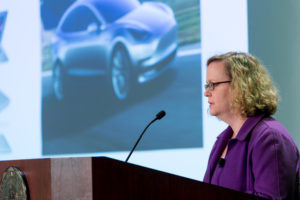Watch highlights from Amy Prieto’s President’s Community Lecture above.
Watch the full lecture here.
Every second of every day, our lives are touched by batteries. In our cars. Our phones. Our homes. We don’t think about them – that is, until they don’t work. Or in some unfortunate cases, when they burst into flames.

So says Amy Prieto, a chemist, materials scientist and entrepreneur who’s passionate about making a better, faster, safer, cheaper battery. And she’s well on her way to introducing disruptive new technologies to an industry still plagued by issues of performance, reliability and safety.
An associate professor in the College of Natural Sciences’ Department of Chemistry, and the founder and scientific head of Fort Collins startup Prieto Battery, Prieto was the featured speaker for the President’s Community Lecture Series May 24. Hosted by CSU President Tony Frank, the lectures invite the Fort Collins community to get to know some of CSU’s most innovative faculty members.
The story of Prieto Battery
Beginning with a brief history of the battery (some of which dates back to 200 B.C.E.) and an argument for why batteries are beautiful, not boring, Prieto also shared her story. That is, how did a solid-state chemist with no background in battery technology become the head of a successful battery startup?
Much of that unexpected trajectory she owes to landing at CSU as an assistant professor in 2005. Here at CSU, she said, she’s enjoyed top-notch mentors, and an intellectual environment that fosters big ideas as well as collaboration. And in Fort Collins, she found investors who believed in her ideas early on. She didn’t find that kind of support in other places, including “on the coasts.” She recalled some traditional venture capitalists questioning how a cutting-edge battery technology could possibly come out of – gasp – Colorado.
“I heard some comments about my very young age, and lack of experience in the battery industry,” she said.
In 2009, Prieto founded her company, which is commercializing a three-dimensional, solid-state battery that deviates in almost every way from conventional lithium-ion batteries.
Prieto’s team has developed a 3D, porous, copper-based foam battery architecture coated with a polymer electrolyte and surrounded by a cathode matrix. It provides a power density orders of magnitude greater than comparable two-dimensional batteries today.
Prieto Battery has received investment from Intel Capital, which is interested in Prieto batteries for wearable medical devices and the “Internet of things.” And more recently, Prieto Battery has received support from Stanley Black & Decker to explore batteries for power tools and lawn equipment.
Earlier in her career, when Prieto and her graduate students started thinking about battery performance, they sat down and listed what they wanted their batteries to be. High power. High performance. Free of a liquid electrolyte, and devoid of toxic chemicals. And perhaps most notably, they wanted to make their batteries on the benchtop, for low-cost manufacturing and scalability. No cleanrooms or vacuum chambers. Prieto joked that the dusty chemistry building at CSU was the perfect backdrop for this ambitious battery project.
Crediting the people around her
Prieto brimmed with praise for her company partners, as well as graduate students and postdocs past and present who, especially in the beginning, were game to try new things. “It’s really fun to have a lab full of people who like steep learning curves,” she said.
She also gave shout-outs to her mentors, to CSU Ventures and to the Central Instrument Facility, a CSU core facility where Prieto and countless others have conducted materials testing and research. She stressed the transformative power of basic research, which doesn’t always grab headlines or turn the heads of funding agencies, but provides fundamental discoveries that drive progress and innovation.
To date, Prieto Battery has had six patents issued in three countries, and has 10 full-time employees. The company is located at the Research Innovation Center on the university’s Foothills Campus.
Prieto said she hopes she conveyed her approach to science. “It is a process, and it is something you can always work on. That’s why it’s an amazing career – because I get to learn something new every day, and I know that if I work hard every day, I can just keep getting better.”